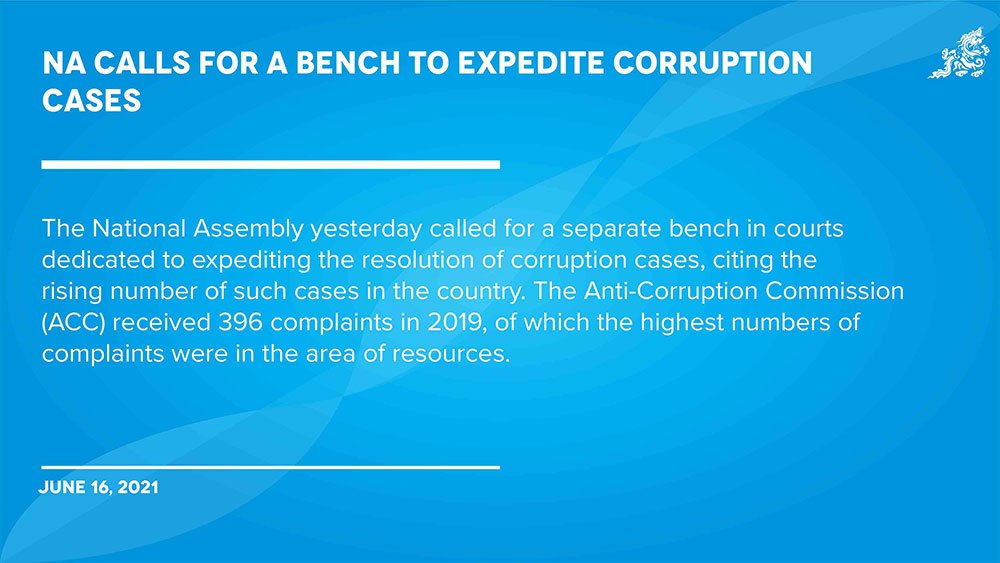Given the increasing number of corruption cases in the country, the National Assembly yesterday called for a separate Bench in courts to expedite the resolution of such cases in dzongkhags.
The Good Governance Committee of the House reviewed the Anti-Corruption Commission (ACC) report 2019 and tabled this recommendation.
Dewathang-Gomdar Members of Parliament (MP) Ugyen Dorji and the chairperson of the Committee submitted five recommendations.
Opposition Leader Dorji Wangdi said that today Thimphu has five different benches to deal with different types of cases and these were created based on the needs with time. “So based on the current situation, it shouldn’t be a problem to have a separate bench. Things should change with changing times.”
However, the House decided to leave it to the judiciary whether to create new benches or consolidate it with the existing courts.
MP Ugyen Wangdi, who is a member of the Committee, said that the members felt the need for it but it did not propose to have a new bench exclusively for corruption cases. “It could be consolidated with existing benches. Since it’s important we recommended to the Parliament that a bench be designated.”
The Committee also recommended supporting the Commission’s recommendation to endorse the Rules and Regulations by Parliament. MP Ugyen Dorji said that as per the Anti-Corruption Commission’s annual report, most corruption cases were non-compliance to rules and regulations. “It was found that rules and regulations formulated are not in line with the mother Act.”
However, 28 of the 38 members present in the Parliament did not support the recommendation, reasoning it was ACC’s right to formulate the rules and regulations instead of Parliament.
The Committee recommended ACC and judiciary to allow the frozen properties to be used during the interim period because the current practice of freezing the properties pending the judgment has led to loss of property of income.
The House did not deliberate the recommendations since the ACC (amendment) Act, which was recently endorsed has two new provisions that allow it to use, operate, lease or continue work.
The new Section 104 (4) states, “Any moveable property which is frozen, seized or confiscated under this Act may allow the use, operate or lease pending the outcome of the investigation or auction by the commission with approval from the Court as per the Rules and Regulations adopted by the commission.”
Section 108 (3) states, “Any immovable property or Developmental activities which are frozen, seized or confiscated may be allowed to use, operate, lease or continue work, pending the outcome of the investigation and prosecution with approval from the Court, as per the rules and regulations adopted by the commission.”
Meanwhile, the Committee dropped the ACC’s recommendations to establish a security unit in the ACC manned by security personnel to provide security related service because the officials are constantly affected by threats and verbal abuse by those affected.
It also dropped the recommendations to strengthen the legal framework and counselling services to the ACC officials who have to often go under anxiety and stress due to work.
“This is an administrative issue and it could be dealt with by the ACC with relevant agencies or government bilaterally,” MP Ugyen Dorji said.
The ACC received 396 complaints in 2019, which is an increase of 63 complaints as compared to 2018. A total of 138 complaints were from known sources and 258 complaints from anonymous sources.
As per record of the ACC, the highest numbers of complaints were in the area of resources followed by contract and personal, and abuse of function.
The deliberation on two recommendations will continue today where the committee has proposed the Office of Attorney General to expedite the recovery of assets. MP Ugyen Dorji said that there were many cases of assets not being reinstituted by the government.
“Most of the corruption is committed at the policy level and in the electoral system,” he said. “So, the committee recommends ACC to conduct corruption risk management henceforth.”
By Yangchen C Rinzin
Edited by Tshering Palden


